Asphalt pavement is manufactured from a mixture of bitumen, which gives the product its signature black color, and an aggregate, including crushed rocks, sand, and gravel.
When the products are combined, heated, and poured, they create a smooth, durable surface that can be used for multiple residential and commercial purposes, from driveways to parking lots.
Asphalt is robust but requires proper maintenance to ensure it stays in good condition, preventing avoidable repairs.
When it comes to asphalt pavement preventive maintenance and repairs, let the best paving company in New Jersey, NVN Paving, help you protect your investment and save you money while extending the life of your asphalt pavement.
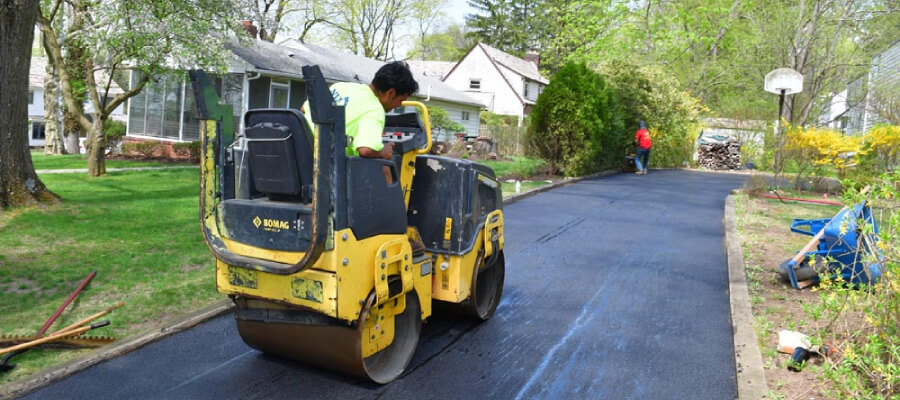
 What is Pavement Preventative Maintenance?
What is Pavement Preventative Maintenance?
Regular asphalt maintenance is crucial for several reasons, including:
- Prevent severe damage: Pavement preservation can prevent serious damage, such as major cracks and potholes, reducing the asphalt’s life cycle cost.
- Extend the asphalt’s lifespan: Protect your investment with regular cleaning and asphalt patching.
- Improve safety in roads and parking areas: The safety of highways, side roads, and parking structures alike is essential, especially in winter.
Understanding the Role of Asphalt Binder in Pavement Longevity
An asphalt binder is a sticky, viscous product whose primary role is holding the aggregate together in cold and hot mix asphalt, although this is not the ingredient’s only purpose.
The asphalt paving binder also protects the pavement surface from damage commonly caused by sunlight exposure, chemicals, and moisture.
A quality binder also protects the pavement condition by increasing the surface’s flexibility and preventing small cracks that can turn into a large pothole.
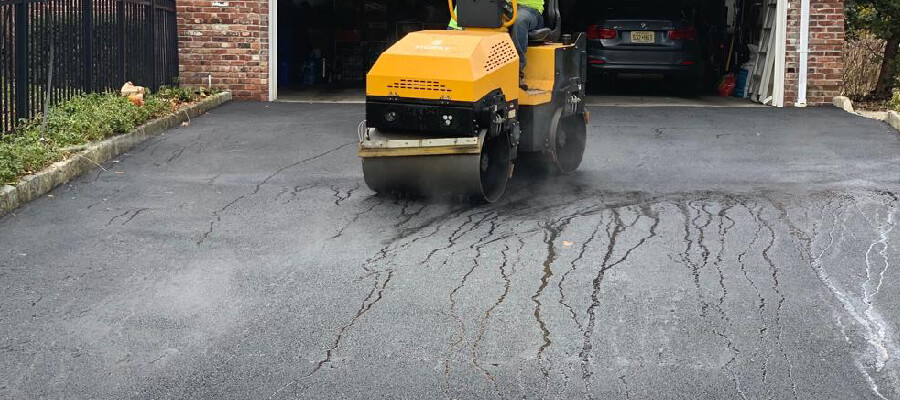
 How Do You Maintain an Asphalt Pavement Surface?
How Do You Maintain an Asphalt Pavement Surface?
The best way to prevent asphalt repairs is to maintain the pavement properly.
Don’t settle for relatively good condition and instead, follow these simple and cost-effective tips to prevent premature deterioration and keep asphalt in excellent condition:
- Clean asphalt often: Use a broom, soapy water, and a hose to eliminate superficial stains and wash away dirt, debris, and loose rocks.
- Apply chip seal or asphalt pavement sealant regularly: Talk to a pavement company to seal your residential or commercial asphalt surfaces regularly.
- Fix cracking immediately: Repair cracking ASAP before it spreads.
- Keep your gutters clean: Dirt and debris from overloaded gutters can fall onto the asphalt driveway or walkway, creating damage and staining.
- Protect the surface during snow removal: Avoid scraping the asphalt while clearing away accumulation in winter.
Identifying and Addressing Small Cracks in Asphalt Surfaces
Asphalt cracks are unavoidable, mainly due to sub-base instability, poor drainage, temperature fluctuations, traffic load, and sun exposure.
A large crack or severe damage, such as a massive pothole, can require emergency asphalt repair, but what about the smaller cracks?
As a rule, if the cracks are wider than one-half inch or if the crack is slightly smaller and in the center of the driveway, as opposed to the edges, it needs to be repaired ASAP.
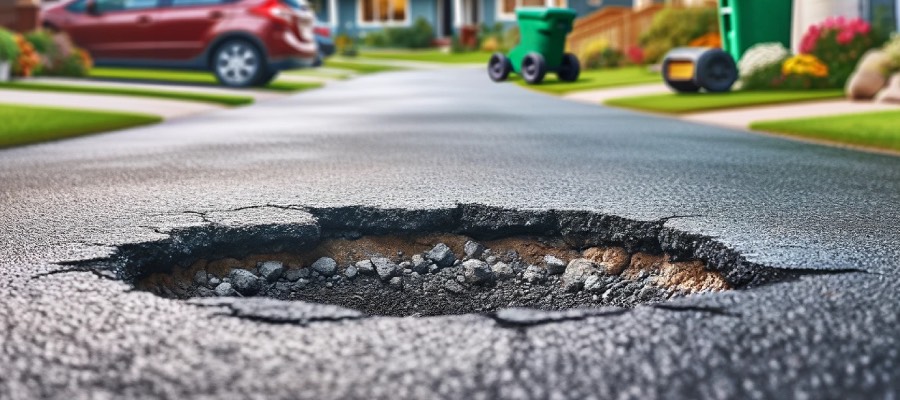
The Impact of Oil Stains on Asphalt Pavement Surfaces
Oil spills can alter the chemical makeup of asphalt, leading to severe degradation and a total breakdown, but there is a cost-effective way to quickly clean up an accidental spill on your driveway or roadway.
A minor spill can be emulsified with soapy water; however, the oil must be soaked up if the spill is significant.
Cat litter and baking soda are great options for quickly and inexpensively absorbing oil.
Avoid oil pavement markings on your driveway by laying down a piece of cardboard or, better yet, by avoiding changing your car’s oil or working with oil on a paved surface.
 Best Practices for Asphalt Paving in New Jersey
Best Practices for Asphalt Paving in New Jersey
The key to a firm asphalt surface is through sufficient installation, which is a multi-step process that includes the following:
- Removal of existing pavement
- Sloping and ground grading
- Sub-base preparation
- Repairs
- Binder layer
- Asphalt installation
The right preparation is important, and that’s exactly what you can expect when you receive residential and commercial asphalt paving services from NVN Paving!
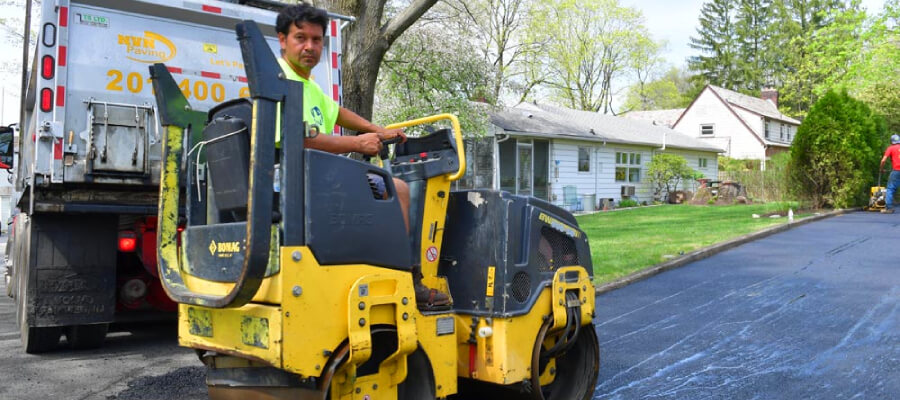
Importance of Sealing in Asphalt Pavement Maintenance
The importance of regularly sealcoating parking lots and driveways cannot be overstated.
Applying a fresh layer every three to five years helps prevent oxidation through sun exposure, reduces cracks and damage, and enhances the look of the asphalt, all the while extending the life of your system.
Preventing Permanent Deformation of Asphalt Pavements
If you’ve ever noticed clear tire marks on asphalt, you’ve witnessed a phenomenon called rutting.
These ruts mainly occur in high-traffic areas or simply when the same tire path is repeatedly driven over.
The major causes of ruts and deformation include:
- The soil beneath the pavement is unstable: If the soil is not correctly cleared, leveled, and graded, the asphalt will not lay properly. Eventually, the unstable soil will buckle, leading to severe degradation or, worse, the need to completely replace the surface.
- Improper sub-base thickness: Depending on the intended use, the base must be at least 4 to 6 inches deep. The product itself must also be thick enough to handle the weight.
- An insufficient mix: The wrong ratio can impact the asphalt’s flexibility and durability.
Proper site preparation, asphalt mixing, and installation are the best ways to prevent deformation and rutting.
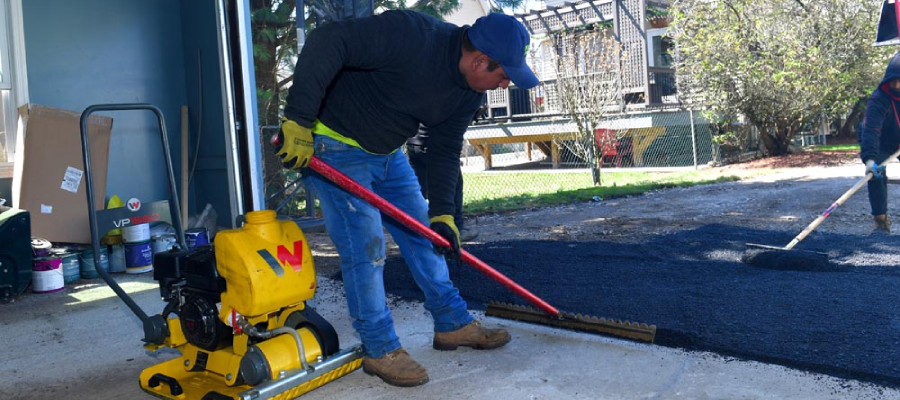
Routine vs. Emergency Maintenance for Asphalt Pavements
Routine preventative maintenance, including regular sealing, cleaning, stain removal, and yearly inspections, will help prevent severe damage, but what constitutes an asphalt emergency?
Here are instances when you need to contact a professional immediately to inspect and repair your asphalt surfaces:
- Large potholes
- Severe cracks that are spreading rapidly
- Instability
- Serious safety concerns, such as massive chips or broken asphalt chunks
 Enhancing the Longevity of Parking Lot Surfaces
Enhancing the Longevity of Parking Lot Surfaces
An asphalt parking lot can last anywhere from 10 to 25 years, but only if you tend to the surface properly.
In addition to a yearly inspection, prompt repairs, and regular seal coating, there are other ways to preserve the integrity and appearance of parking surfaces, including:
- Maintain the parking load with the correct spacing
- Ensure water drainage
- If the paint is severely faded, contact a professional to update your parking lot striping
- Promptly remove ice and snow
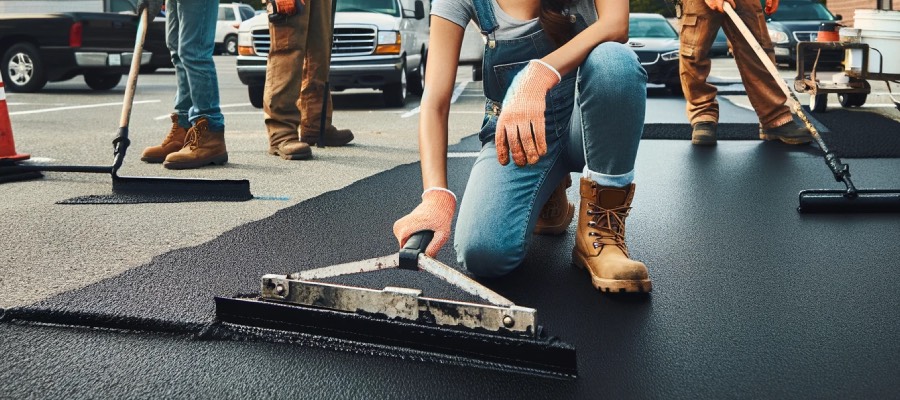
Preventive Maintenance Schedules for Optimal Asphalt Pavement Care
Here are the best practices for maintaining your asphalt surfaces and ensuring you don’t need to call the driveway and parking lot paving experts at NVN Paving for an emergency fix:
- Apply sealant immediately after application
- Clean at least one to two times per year
- Reapply sealant every three to five years
- Repairs cracks immediately as they appear
- Avoid oil spills to prevent degradation and pavement markings
Don’t forget to contact a pro to schedule a yearly inspection!
Corrective Maintenance Ensures a Longer-Lasting Asphalt Surface
Preventative and regular maintenance is the best way to extend the life of any pavement surface, from heavily used parking structures to side roadways or backyard driveways.
A properly maintained product is also the best way to keep your costs down in the long run while protecting your investment.
The team at NVN Paving can help keep your asphalt functional and attractive.
In addition to residential and commercial asphalt repairs and maintenance, we offer several other services, including:
- Concrete installation
- Cracked concrete repair
- Line striping
- Catch basin repairs
- ADA upgrades
- Emergency services
We have been providing stellar customer service for years.
Our talented, experienced professionals are dedicated to providing you with fantastic service at a fair price.
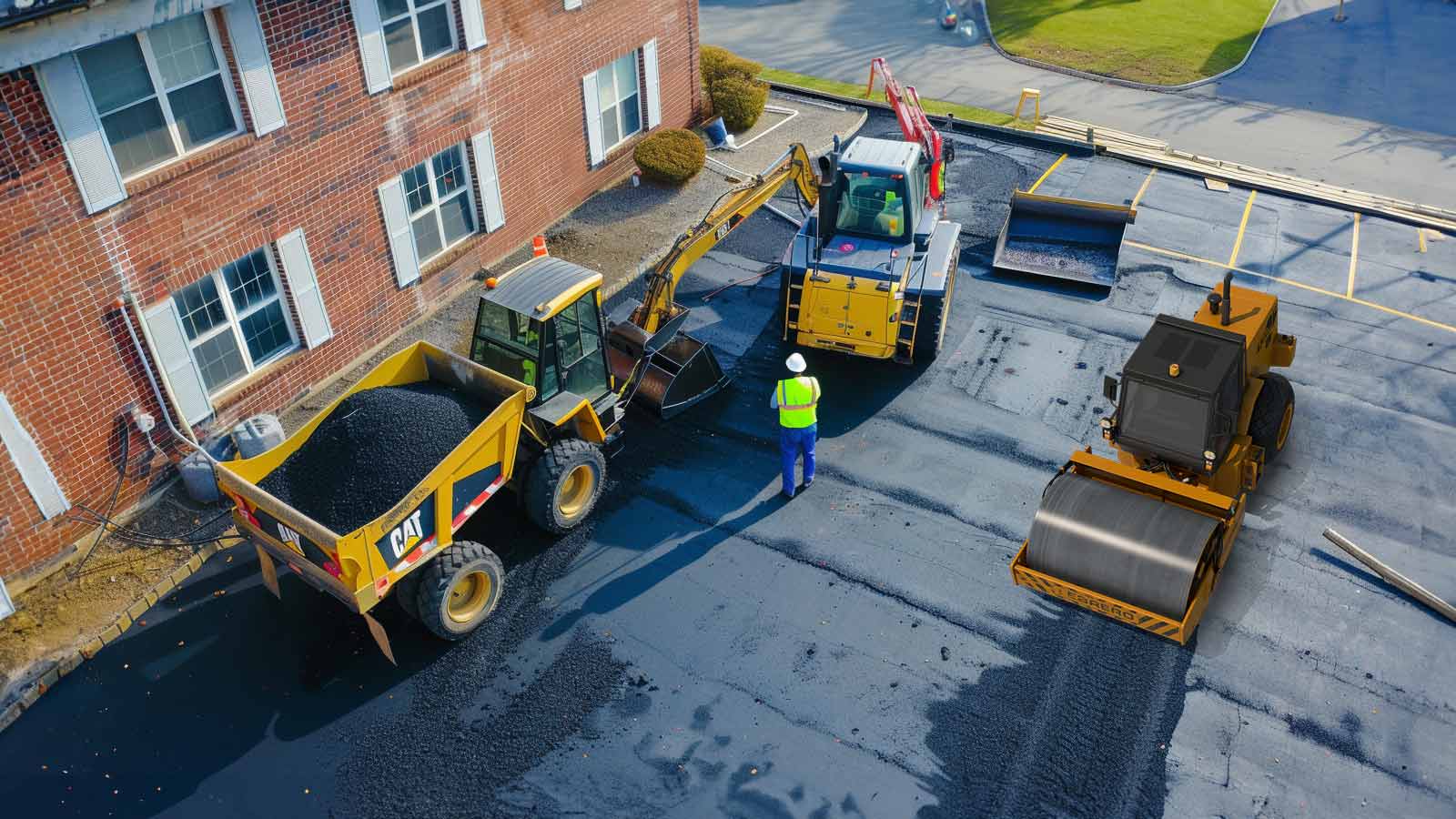
 What is Pavement Preventative Maintenance?
What is Pavement Preventative Maintenance? How Do You Maintain an Asphalt Pavement Surface?
How Do You Maintain an Asphalt Pavement Surface? Best Practices for Asphalt Paving in New Jersey
Best Practices for Asphalt Paving in New Jersey Enhancing the Longevity of Parking Lot Surfaces
Enhancing the Longevity of Parking Lot Surfaces
